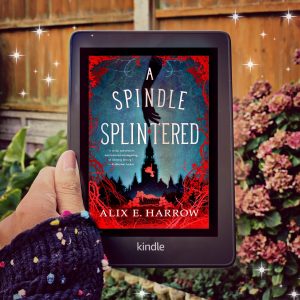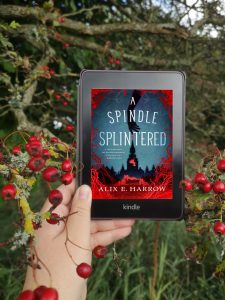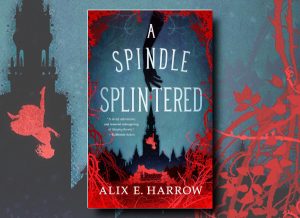A SPINDLE SPLINTERED by Alix E. Harrow (BUDDY READ BOOK REVIEW)
let’s not pretend girls with swords don’t get shit done…
The Buddy Read Dream Team (Nils and myself, Beth) are back. Nils managed to get her hands on arcs of Alix E. Harrow’s brand new fairy-tale retelling A Spindle Splintered. It’s out TODAY from Tordotcom Publishing (you can grab a copy here) and is the first novella in a new series called Fractured Fables (omg):
It’s Zinnia Gray’s twenty-first birthday, which is extra-special because it’s the last birthday she’ll ever have. When she was young, an industrial accident left Zinnia with a rare condition. Not much is known about her illness, just that no one has lived past twenty-one.
Her best friend Charm is intent on making Zinnia’s last birthday special with a full sleeping beauty experience, complete with a tower and a spinning wheel. But when Zinnia pricks her finger, something strange and unexpected happens, and she finds herself falling through worlds, with another sleeping beauty, just as desperate to escape her fate.
We both love Alix E. Harrow, and fairy tales, so what were your expectations on starting A Spindle Splintered?
Beth: I was expecting beautiful prose, and some kind of emotional… trauma, I guess? Which is Once and Future Witches’ legacy by this point. For me at least. I was expecting, in terms of setting and tone, something very similar to that book. Your typical fairy-tale setting wrapped in Harrow’s stunning lyrical story-telling. I was very much looking forward to reading what kind of twist she’d put on the story of Sleeping Beauty.
Nils: I’ve read both of Harrow’s full length novels – The Ten Thousand Doors of January and The Once and Future Witches, so like you Beth, I was definitely expecting beautiful prose, one that would be atmospheric, whimsical and immersive. I knew Harrow would put a feminist twist on Sleeping Beauty too, she’s an author who always portrays women and young girls as the dictators of their own story, they’re never subservient to nor driven by a man’s story arc.
Beth: Yes exactly! I was expecting a feminist version of Sleeping Beauty basically!
Nils: And Harrow delivered! What I didn’t expect though was to feel so much emotion, honestly speaking I didn’t think a novella of a 100 pages could effectively be emotive, or make me connect and care for the characters on a deep level. How wrong was I, Beth?!
Beth: Ha! So wrong! It really speaks of Harrow’s skill as a writer that she is able to pack such emotional punches whether in long form or more constricted forms!
What were your initial impressions?
Beth: Ok bare with me, but my initial impressions weren’t great in all honesty… but that’s only because I’m not a massive fan of that Urban Fantasy Tone. The over-familiar voice that keeps throwing pop culture references at you (only because there’s inevitably an American one I don’t get).
Nils: Ah yeah, I’m the same. I’m not the biggest fan of Urban Fantasy either, it’s a genre I tend to avoid because on the whole I don’t enjoy fantasy stories set in our world with modern technology and pop culture references because they don’t feel like escapist reads to me.
Beth: Yes! That’s my problem too! I don’t feel like I’m far enough removed somehow?
However, this was, I can’t stress enough, just my initial impression of the opening pages though. I found Harrow actually wielded this tone very well; she counter-balanced it with beautiful writing, and it also seemed to evolve and mature as Zin, our protagonist, learned and matured.
Nils: Completely agree there Beth. I also usually steer clear of books which predominantly feature illnesses, those kinds of narrative arcs trigger my anxiety, so once I discovered our main protagonist, Zinnia, suffered from a terminal illness I was really apprehensive.
Beth: Talking of expectations, that was definitely something I hadn’t expected. It’s not often you pick up a story and you’re told straight away that you have a limited time with your protagonist.
Nils: That’s true, and putting my initial anxiety aside, that was quite a hook for me too – what will our protagonist do with the time she’s given? Plus Alix E Harrow is a favourite author of mine, so I wanted to give this book a chance, (I’m so thankful I did) and I have to say very early on she won me right over. Firstly, Zinnia’s illness, Generalised Roseville Malady, to the best of my knowledge, is not a real one so this didn’t set off my anxiety as my brain couldn’t start imagining that I had symptoms of it!!
Beth: Ha, it set off us Googling, didn’t it!
Nils: It did!! We also don’t stay in the real modern world for very long, and at that point the story became the escapist read I wanted. What really amazed me in though, as Beth mentions, was the depth and nuance to Harrow’s prose and narrative voice, for example in this line:
“I’m always annoyed when people are surprised that I have a personality beyond my disease, as if they expect me to be nothing but brave smiles and blood-spotted handkerchiefs.”
This line is so true, as someone who has a disability and growing up has experienced people who cannot look beyond my wheelchair, who look surprised when I crack jokes and don’t sit and wallow in self pity, Harrow struck a real chord with me. Zinnia was so damn relatable.
Tell us about the story and themes; anything in particular struck you?
Beth: I loved that Harrow was very much working within her MO of stories and their importance, their effects on people, their nuances, the way they can shape lives.
 Nils: Oh yes, great point, I love this about Harrow’s books too. She takes the concept of Sleeping Beauty and at every turn she twists it, she subverts every trope, even mocks them, but she also makes the story recognisable whilst also putting across an inspiring message; if we’ve been dealt a shitty hand in life, we don’t have to accept that as our fate, we ultimately are the ones who can change the narrative instead of just accepting life as it is.
Nils: Oh yes, great point, I love this about Harrow’s books too. She takes the concept of Sleeping Beauty and at every turn she twists it, she subverts every trope, even mocks them, but she also makes the story recognisable whilst also putting across an inspiring message; if we’ve been dealt a shitty hand in life, we don’t have to accept that as our fate, we ultimately are the ones who can change the narrative instead of just accepting life as it is.
Beth: It was such an empowering message. Challenging the roles society has forced you into. I loved Zin’s anger:
In my world there’s nothing I can do to save myself. No curse to break, no fairy to defeat. But it’s different here. You can do something other than stand around and wait.
Her anger really made me consider the privilege of freedom so many of us have, and take for granted; and what those without must think of those with.
Nils: I loved her anger and frustration. In a way Zinnia shows what having limited freedom actually means.
Beth: It’s a perspective plenty of people won’t have considered.
According to Harrow’s acknowledgments, she’d wanted to “Spider-Verse a fairy tale”, and there is no better way to put this story. As we all know with fairy tales, there are countless versions of the same stories present throughout history in different cultures, told in different ways for different purposes. What I loved about A Spindle Splintered was how it was an exploration of the idea of the connections between the different versions and how a protagonist can gain agency of their own story; whilst at the same time being a story about a Sleeping Beauty figure lacking agency and trying to find it for herself. Harrow has created an incredibly moving version of the Sleeping Beauty story, a modern retelling that has recognisable real-world implications that can be related to.
Nils: Oh Harrow definitely weaves all the past and present Sleeping Beauty narratives together in such a clever way. When I read the quote below, I literally clapped.
I think you’re all—well, I think we’re all versions of the same story retold in different realities. The universe is like a book, see, and telling a story is like writing on a page. And if a story is told enough times, the ink bleeds through.
Beth: Such a powerful image!
Nils: As I’ve mentioned before I believe A Spindle Splintered handles the themes of illness and disability realistically. Through Zinnia’s character we see how overwhelmed and suffocated she is by her parent’s protective love which conflicts with her own acceptance for how little time she has left. Zinnia has accepted it whereas her parents never will. So it’s completely understandable why she would want to escape into a fairytale-esque story, why she’s so obsessed with fatalistic protagonists. I absolutely loved how at the beginning of the novella Zinnia is inspired by their gothic beauty but by the end all those princesses are inspired by her. I hope this makes sense, but basically what I’m saying is for something that’s so short, there’s certainly a lot to digest from it.
Beth: There really is Nils. I had a proper mind blown moment when Zin’s father’s obsessively hunting for a cure for his daughter’s incurable illness was held up alongside Princess Primrose’s father burning all the spindle wheels in the kingdom. There really was so much to unpack from this story.
Lets talk characters…
Beth: I can’t talk about my favourite one because I don’t want to spoil anything!
Nils: Ooh I think I know who you mean, was it the person we meet in the woods? With the creepy raven?
Beth: 100%
Nils: Oh that character was fab, and their backstory was not quite what we thought it would be.
You loved Charm though, right Beth?
Beth: How can you not?! “…A deux ex machina in black jeans.”
Nils: Haha, yes, that’s Charm!!
Charm and Zinnia had the best friendship! Both were sparky, snipey but their bond was so pure. Zinnia lived in a fictional world of dying princesses, whereas Charm lived in a scientific one, therefore they somewhat balanced each other out. Zinnia may have been a flawed character with some traits of selfishness and stubbornness, but there was a lot of her I saw in my younger self. Her attitude towards life, her awkward interactions with other people, her love of escapism, they mirrored a lot of what I have felt too. Therefore I deeply cared for how her narrative would fare by the end.
Beth: I loved Zinnia, you can’t help not; aside from her bravery and the choices she makes, her vulnerability and flaws (seriously Harrow it’s a novella – how?!) I also really began to appreciate her sense of humour. I did struggle at the start with the familiar way she narrates to the reader, but as the story progressed and I became accustomed to it, I did really love her quips and attitude:
“Oh, bullshit.”
“How dare you-”
“I’m sorry. I meant: bullshit, your Majesty.”
Nils: Big LOL moment when I read that bit!
Beth: I thought Princess Primrose was a great character too, I had so much respect for all the little ways she kept surprising Zinnia. We’re so used to women in fairy tales having no agency or personality, and it’s clear Zin expects the same of her. Instead, it’s very much the male characters who occupy that kind of character-but-not-a-person role.
What do you feel were the strengths of this book?
Nils: Where do I begin? I could seriously gush so much about A Spindle Splintered but it would all fall into spoilery territories. However, I cannot stress enough again how exquisite Harrow’s writing style is.
Beth: Goddammit Nils this was what I was going to talk about being the strength too!
Nils: Apologies my friend! It’s definitely a standout trait of Harrow’s isn’t it? No word is ever wasted, every sentence holds a myriad of depth and meaning. I honestly don’t know how Harrow manages to pack such a punch in everything she writes. It’s sorcery isn’t it Beth? It has to be.
Beth: IT IS THE ONLY EXPLANATION.
I bookmarked the following quote because I thought it such a great example of Harrow’s combination of that lighter Urban Fantasy/YA tone and her ability to create almost poetic visuals:
The damn bird leads us in circles and loops, twisting and doubling back so many times I come very close to stomping off on a path of my own making, screw magic – but the shadows fall strangely across the moor.
I think the other strength of this novella is how Harrow deconstructs the elements and roles of this particular story type and reassigns purpose and voice. The sheer skill of the craft on display here was just so wonderful to read!
Was there anything you wish had been done differently? Was there anything that didn’t work?
 Beth: Again, I don’t want to spoil anything… There were three characters I wish had had a stronger presence? Obviously, the form is quite constrictive, but I found their silence… ironic? Unless it was deliberate? Highlighting the flaws of our protagonist and ultimately her imperfect humanity? I dunno.
Beth: Again, I don’t want to spoil anything… There were three characters I wish had had a stronger presence? Obviously, the form is quite constrictive, but I found their silence… ironic? Unless it was deliberate? Highlighting the flaws of our protagonist and ultimately her imperfect humanity? I dunno.
Nils: I’m all for having extra scenes where these characters have more of a voice too. I’m just greedy and I wanted more than a hundred pages!
Beth: I mean yeah… I liked that the size reflected that of a traditional fairy tale. And I was definitely satisfied by the end. But I could happily gorge myself on Harrow’s writing.
Nils: That’s exactly it, I get so caught up in her writing style I just can’t get enough of it.
On a very personal opinion, and this only jarred me at the very beginning of the story and I didn’t notice it at all later on, but the American pop culture references wasn’t something I was fond of, but perhaps that was just because I didn’t understand the context behind them.
Beth: I got most of the pop culture references, I smirked hard at “and i thought we agreed never to mention joanne or her works ever again”. But there was one I didn’t get, and now I can’t for the life of me remember which one it was. Damn that’s going to bug me…
Finally, did it meet your expectations?
Beth: Yes and no. The prose absolutely met my expectations. But the story was so clever, it was so much more than what I expected!
Nils: Same! This little novella exceeded my expectations, as Beth says, everything about it is so cleverly done.
Beth: Harrow has written a fun retelling on the surface, with so many layers of thought-provoking depth. There were some proper gut-punches of emotion, of not giving up, of not giving up yourself most of all.
Nils: And then there’s humour, melancholy, whimsy, and like you said also so much to reflect upon. This is a story where the princesses refuse to die, and let’s face it, this is the story we all needed. Harrow is one hell of a storyteller.
Favourite Quotes
Nils: Hey Beth…
I can’t let our review finish without mentioning this quote…
A few hours ago it had seemed like a perfectly fine idea to go have a little adventure, face down a fairy, rescue a princess (and maybe, somehow, myself), and zap back home like Bilbo strolling back into the Shire. But now–huddled in the
cold dark with a cursed princess and a tightness in my chest that’s either terror or impending death-I’m feeling more like Frodo, whose story was full of darkness and danger. Who never did get to return home, or at least not for long.
Yessss! I can’t believe Harrow worked in such a cool Lord of the Rings reference!
Beth: I mean ultimately, this is why we connected to Zinnia so well. She loves stories, just like us. It’s hard not to love someone who also uses Lord of the Rings references in her day-to-day.
Nils: Exactly. This is something that comes across in all of Harrow’s books, she’s an author who shows a love of reading.
Beth:
In her face I see the cold weight of the choices she didn’t have and the chances she didn’t take, the weary years waiting for fate to swallow her daughter the same way it swallowed her. I see her choosing now whether to make her love into a cage of a key.


[…] buddy reading A Spindle Splintered together, Nils and Beth are back with a buddy read review of the (MUCH ANTICIPATED) sequel, A […]